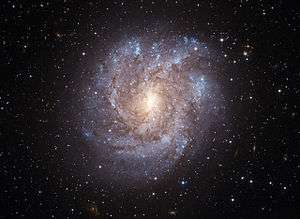NGC 2082
| NGC 2082 | |
|---|---|
|
NGC 2082 | |
| Observation data (J2000[1] epoch) | |
| Constellation | Dorado |
| Right ascension | 05h 41m 50.9s |
| Declination | −64° 18′ 5″ |
| Redshift | 1184 ± 6 km/s [2] |
| Distance | 60 Mly (18.4 Mpc)[3] |
| Apparent magnitude (V) | 12.6[2] |
| Characteristics | |
| Type | SAB(rs+)c [2] |
| Apparent size (V) | 1′.8 × 1′.7[2] |
| Other designations | |
| ESO 86-21, PGC 17609, HIPASS J0541-64, IRAS 05415-6419, 2MASX J05415112-6418039, SLK 499, FHW LMC B0541-6417, SGC 054136-6419.4, PSCz Q05415-6419, ISOSS J05418-6418 | |
NGC 2082 is an intermediate spiral galaxy in the Dorado constellation.[4][5] It was originally thought to be part of the Dorado Group of galaxies,[6] but was later removed.[7] It was discovered on November 30, 1834 by John Herschel.
Supernova 1992ba, a Type II, was discovered by Robert Evans in NGC 2082.[8]
References
- ↑ "NGC 2082". DeepSkyPedia. Retrieved 2013-06-22.
- 1 2 3 4 "NASA/IPAC Extragalactic Database". "Results for NGC 2082". Retrieved 28 June 2013.
- ↑ "The dusty beauty of NGC 2082". Retrieved 28 June 2013.
- ↑ "Revised NGC Data for NGC 2082". Spider.seds. Retrieved 2013-06-22.
- ↑ "Wikisky". Wikisky. Retrieved 2013-06-22.
- ↑ Huchra, J. P.; Geller, M. J. (June 15, 1982). "Groups of galaxies. I - Nearby groups". Astrophysical Journal. 257 (Part 1): 423–437. Bibcode:1982ApJ...257..423H. doi:10.1086/160000.
- ↑ Maia, M. A. G.; da Costa, L. N.; Latham, David W. (April 1989). "A catalog of southern groups of galaxies". Astrophysical Journal Supplement Series. 69: 09–829. Bibcode:1989ApJS...69..809M. doi:10.1086/191328. ISSN 0067-0049.
- ↑ "List of Supernovae". IAU Central Bureau for Astronomical Telegrams. Archived from the original on 11 July 2015. Retrieved 11 July 2015.
Coordinates: ![]() 5h 41m 50.9s, −64° 18′ 5″
5h 41m 50.9s, −64° 18′ 5″
This article is issued from Wikipedia - version of the 7/25/2016. The text is available under the Creative Commons Attribution/Share Alike but additional terms may apply for the media files.
